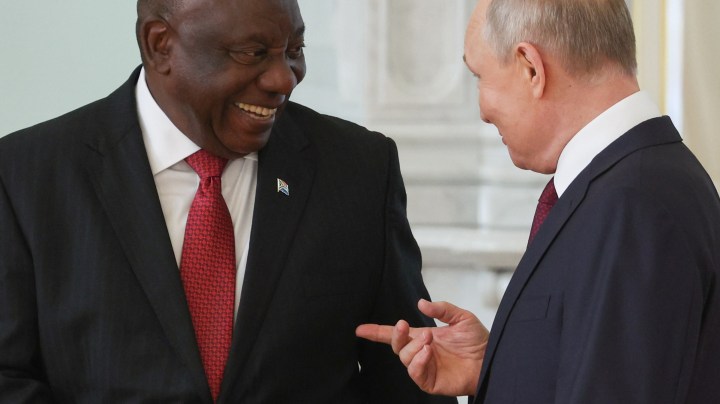WAR IN EUROPE OP-ED
Russia’s renewed economic weaponisation of food and the 13,000 sanctions on the Motherland

The economic war being waged between Russia and the West is escalating, and there will undoubtedly be victims on both sides. Sadly, South Africa is probably at the most risk as the ANC government embraces Russia in actions, if not words.
It’s not easy to be a South African and see President Cyril Ramaphosa warmly embracing Russian President Vladimir Putin at the Russia-Africa Summit in St Petersburg last week, particularly when countries that are so influential to our economic future are imposing successively more stringent sanctions in the hope of ending the war.
With South Africa, however, actions speak louder than words. Any half-hearted attempts to persuade the world that the ANC government is not picking a side threaten to come to nought when the country has one of the few heads of state at a summit attended by a mere 17 African leaders compared with more than 40 in 2019.
Many analysts consider this economic suicide because South Africa relies so heavily on investment and trade ties with the West — and the support the country’s economy gets from Russia is minimal in comparison. However, Putin is working hard at winning the favour of African leaders after walking away from the Black Sea Grain Deal that has kept the market in wheat and corn in equilibrium over the last few years. At the summit, he committed to providing six African countries with free grain for several months.
His rationale for walking away from the grain deal is that Europe was benefitting more than African markets from the safe passage of grain and fertiliser exports from the Black Sea, the agreement assured.
The grain deal was also crucial in alleviating the adverse impact of the war on the rest of the world economy after initially pushing up energy and food prices and setting in motion a vicious inflation spiral. Soft commodity prices subsequently came off their heady levels, waning over the past year and enabling headline inflation to come off its peaks.
But that could well change with Russia’s renewed weaponisation of food by decimating the port infrastructure in Odesa by firing cruise missiles at cargo terminals. Wheat and maize futures increased by 8.5% and 4.7%, respectively, in response to the attacks after having already increased on the news of the grain deal falling apart.
The jury is out on the likely impact on global food prices of the failed deal and subsequent bombings. But supplies in other growing regions are also at risk of what are expected to be unfavourable weather conditions this year, and that doesn’t bode well for food prices this year.
How effective are sanctions?
The risks that Russia’s continued commitment to the war pose to the economic outlook far outweigh any positive news on the inflation or growth front in the developed nations. Governments in the West have pinned their hopes that sanctions will decimate the Russian economy and make the war unaffordable. There’s been much debate about how effective Western world sanctions have been to date. But the good news is that the data are showing that trade sanctions have made a considerable dent in the warring nation’s exports to the group of 37 sanctioning countries.
According to the European think tank Bruegel’s Russian foreign trade tracker, the country’s mineral and energy exports fell by 1.9% between December last year and May 2023. But recent data shows China and India have picked up much of the slack, with exports to China and India rising by about a third versus a 73% decline in exports to Europe and around 30% declines in exports to Turkey, South Korea and Kazakhstan.
China and India’s share of Russian exports has expanded considerably this year, with the data showing that the proportion of mineral fuels exports going to China and India has almost doubled to 70% versus 39% in December 2022, while the proportion of exports to the EU has contracted by 75%.
Meanwhile, exports excluding mineral and energy increased by 1% over the same period, with the value of these exports somewhat surprisingly uplifted by exports to Turkey (rising by 75%) and South Korea (up by 27%) from December 2022 to May 2023, as well as the huge contribution made by China and India.
Sanctions on trade are just a drop in the ocean compared with financial and other sanctions imposed on Russia since the war. According to the Carnegie Endowment, Russia has been subject to more than 13,000 restrictions, giving it the dubious title of the most sanctioned country, according to Alexander Prokopenko, a non-resident scholar at the Carnegie Russia Eurasia Center.
She explores the impact sanctions have had on the Russian economy, saying: “Despite the system of state capitalism in place in Russia, before the war, its economic policy was largely focused on technological development, diversifying exports away from the country’s dependence on fossil fuels, and the relatively free movement of capital. Now those elements have been replaced with capital controls, the labelling of countries as either friendly or hostile, the yuanisation of payments, and the militarisation of budget spending.”
Not only does this signal the fundamental bifurcation of global economic relations under way, but it highlights that South Africa may well be forced into choosing a side that will inevitably undermine its economic fortunes and independence if the government continues to say one thing and do another. DM



















Comments - Please login in order to comment.